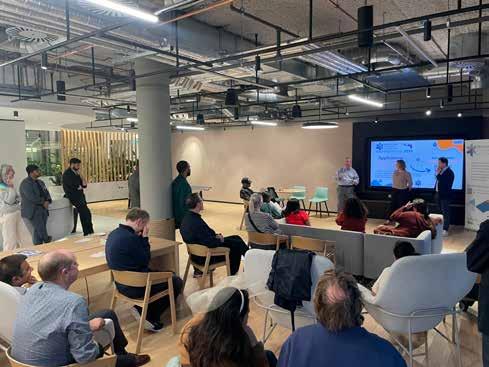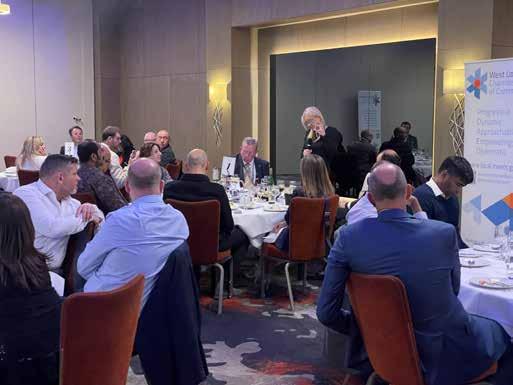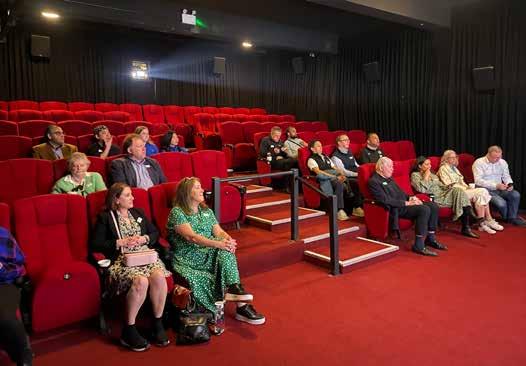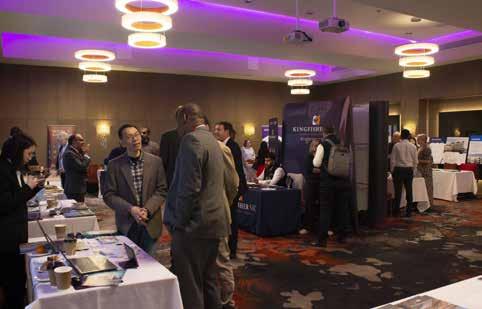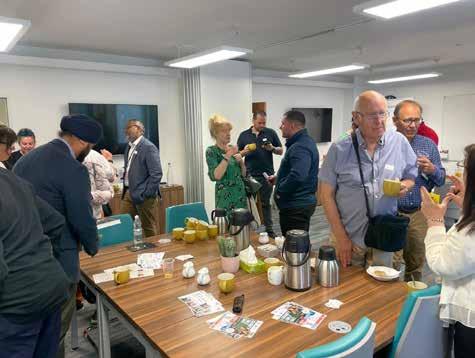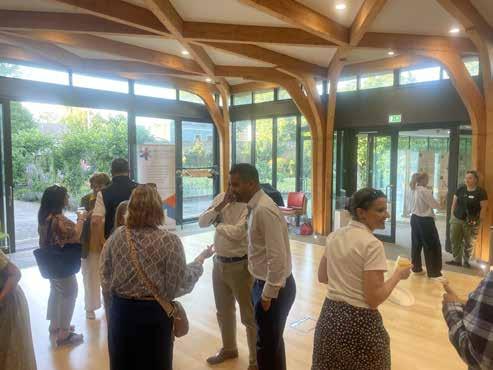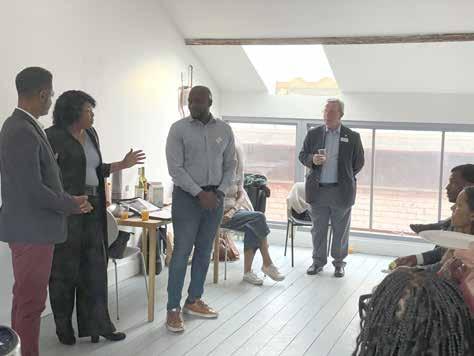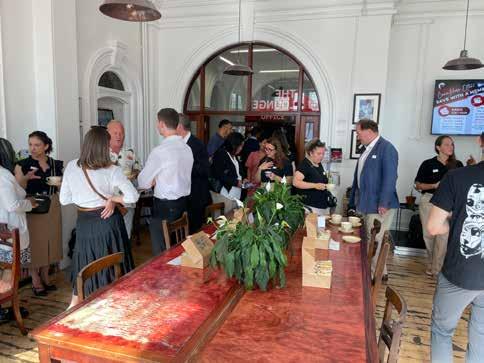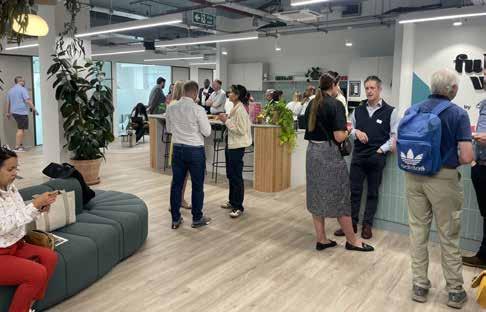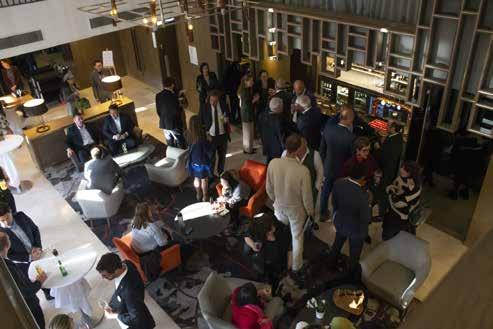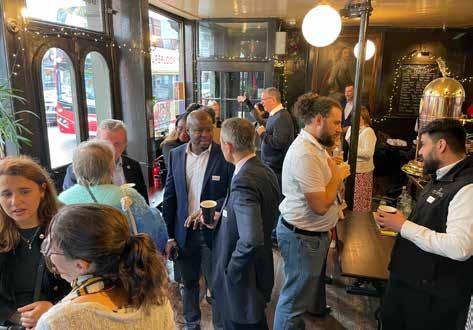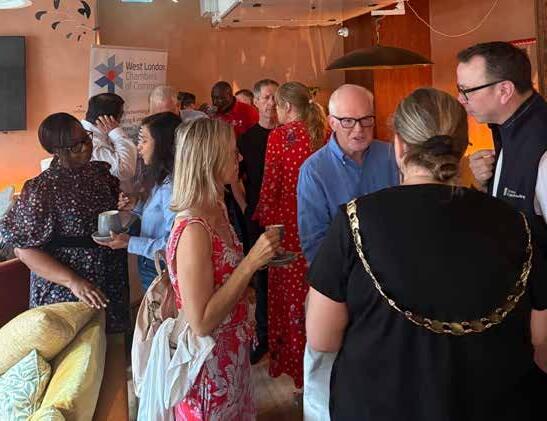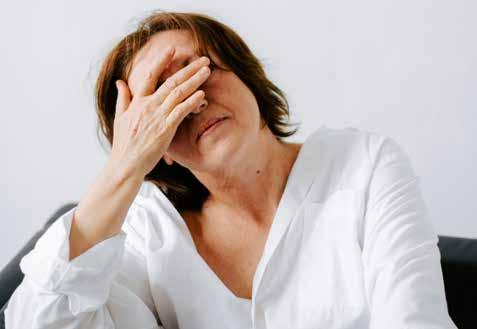
8 minute read
Looking after our wellbeing
Menopause in the workplace: Myth vs Reality
By Lorna Stenson, Help with HR Limited, Independent HR Consultant
Myth: Menopause is a private matter and not relevant to the workplace.
This couldn’t be a further from the truth. Existing legislation and the upcoming Employment Rights Bill make it clear that menopause is a workplace issue.
Menopause affects nearly 4 million working women, aged 45-55 in the UK. And according to 2025 ONS statistics, 71% of working-age women in the UK are employed, making up a significant part of the workforce.
The Employment Rights Bill will introduce a new requirement for larger employers to actively support staff experiencing menopause symptoms through a Menopause Action Pan, while smaller organisations will be provided with guidance.
The Health & Safety at Work Act already requires employers to ensure the health, safety and welfare of their workers; with the IOSH recommending risk assessments specifically for those going through the menopause.
Myth: Menopause is no joke.
Have you heard the one about the £1.5 billion lost annually due to women leaving work because of menopause. Hardly a laughing matter.
The data is clear.
HMRC Courts & Tribunal Service reports that employment tribunal claims relating to menopause have trebled in the last three years. ACAS tells us that one in four claims they handle are disability discrimination claims, including those citing menopauserelated conditions.
Our wellbeing should be important to us all, whether in the workplace or at home. We are now making our wellbeing a priority and by putting our wellbeing first, we are concentrating on our physical and mental health. All articles are contributed by Chamber members. We thank them!
So, the Employment Rights Bill is rolling out in 2026, how ready are you?
Have you got a plan in place? Or just relying on good intentions?
If you’re not sure where to start, begin with a simple conversation. Ask your team what they’d like to see happen and how. Your best source of insight already exists in your business: your people. Listen to them.
As a leader, it’s important that you lead the conversation, shape a positive narrative to help remove the stigma around menopause. Show your commitment by making your business genuinely menopause-friendly. This goes beyond compliance and liability. At its heart, it’s about building an inclusive, adaptive and supportive workplace culture - one that naturally delivers better retention, deeper engagement, and greater productivity.
Don’t approach this with a bare-minimum mindset—it’s short-sighted and could damage your business. You risk losing good people with years of knowledge and experience. You risk undermining your team and eroding the trust that holds it together. And you risk damaging your reputation—and the business you’ve worked so hard to build and grow.
If your business needs Help with HR to navigate the everyday challenges, or the looming Employment Rights Bill changes, then please email me on hello@helpwithhr.org
Ending homelessness starts in the workplace: join the Homelessness Alliance for employers
At Crisis, we know that homelessness is not inevitable, it’s a problem that can be solved. And we also know that employers have a powerful role to play. That’s why we created the Homelessness Alliance for Employers: a growing network of businesses committed to helping prevent and end homelessness through action in the workplace.
The Alliance offers businesses a practical and purposeful way to get involved, no matter your size, sector, or where you are on your social impact journey.
What is the Homelessness Alliance?
The Homelessness Alliance brings together businesses from across the UK to take real action through three simple but impactful pledges:
1. Provide employment and training opportunities for people experiencing or at risk of homelessness.
2. Adopt inclusive employment and recruitment practices.
3. Help end homelessness in local communities through awareness-raising, volunteering, partnerships or fundraising. Businesses can commit to one, two or all three pledges, and choose how to implement them in a way that works for their organisation.
We work closely with each Ally to support their journey. From reviewing internal policies, to developing inclusive recruitment practices, to helping line managers understand how to support someone who discloses housing insecurity, our role is to equip and empower you to take meaningful action.
Why Should Your Business Join?
Beyond the clear social impact, there are a number of benefits for employers who sign up:
• Practical guidance and tools: You’ll receive access to our Best Practice Guide, In-Work Homelessness Guidance, and tailored advice to help implement your chosen pledges.
• Staff engagement and wellbeing: Supporting the Alliance creates opportunities for volunteering, awareness events and meaningful conversations that boost morale and build a sense of purpose.
• Employer branding: You’ll be recognised as an Ally on our website and LinkedIn page, and invited to participate in public case studies, events and campaigns that showcase your leadership.
• Networking and shared learning: Through our webinars, drop-in sessions and peer connections, you’ll join a supportive network of like-minded businesses tackling real-time challenges.

• Positive change from within: Many businesses are surprised to find that some employees are quietly struggling with housing insecurity. The Alliance helps you be better prepared to support colleagues with compassion and confidence What’s Next?
Joining the Alliance starts with a 30-minute conversation where we’ll introduce the pledges, answer your questions, and explore what makes sense for your business. You don’t have to do everything at once, and there’s no cost to join. We’ll work with you at your pace to build an approach that feels both achievable and meaningful.
If you’re interested in finding out more, we’d love to hear from you. Together, we can create workplaces that prevent and end homelessness!
Homelessness.alliance@crisis.org.uk
Dementia demystified: How understanding, care, and lifestyle choices can make a difference
“Empowering families and communities with knowledge, compassionate support, and practical steps for brain health”
Dementia is more than memory loss. It is a progressive condition that affects thinking, reasoning, behaviour and the ability to carry out everyday tasks. It can begin with small changes, such as misplacing items or struggling to follow conversations. Although dementia is more common in people over 65, it can start much earlier in some caseseven in a person’s 40s or 50s. This is called early onset dementia and often presents unique challenges for those affected and their families. Over time, these changes can grow, eventually impacting a person’s independence and confidence.
There are different types of dementia, including Alzheimer’s disease and vascular dementia. Although there is currently no cure, early diagnosis and the right support can make a meaningful difference in maintaining quality of life.
Research shows that several lifestyle choices can help reduce the risk of dementia or delay its progression. A balanced diet that supports brain health is key. Eating more vegetables, fruits, legumes, oily fish and whole grains while cutting back on processed foods and added sugars supports not only memory but also overall wellbeing.
Staying physically active is equally important. Strengthening the core and improving balance through simple activities such as walking or gentle chair-based yoga can prevent falls. This is especially important as falls often lead to hospital stays, which can accelerate cognitive decline in older adults. Keeping the brain engaged through conversation, puzzles, music or art can also slow the effects of memory loss. Just as vital is staying socially connected. Isolation and loneliness have been shown to significantly increase the risk of cognitive decline.
At Right at Home Ealing, Hounslow, Hammersmith and Fulham, we provide person-centred dementia care tailored to each individual’s unique needs. Our caregivers are highly trained, experienced and compassionate, offering support from as little as one hour to full 24-hour care. We focus on maintaining dignity, independence and comfort in the home.
Each month, we host a Memory Café at St Leonards Church in Heston, offering a warm space for companionship, creativity and calm. We also recently in partnership with Alzheimer’s Society organised a successful Living well with Dementia Programme at Syon Park, bringing together families, professionals and local partners to promote understanding and share support. Dementia affects many, but no one should face it alone. With greater awareness, the right care and a compassionate community, we can support those living with dementia to live with dignity and purpose. www.rightathome.co.uk/ ealingandhounslow/
Joseph Pilates
Pilates (named Contrology by Joseph Pilates (1883 – 1967) was created as a system of exercise to keep the body and mind healthy, based on his studies of anatomy, Yoga, Boxing and Gymnastics. Joseph Pilates developed 34 Mat exercises and patented 26 pieces of specialist apparatus, including the Reformer, Cadillac Trapeze Table various Barrels and Wunda Chairs.
Originating from Germany, Joseph Pilates was working in the circus in the U.K. when the First World War broke out and was, therefore, interned in the ‘Enemy Aliens’ camp on the Isle of Man in 1914. He worked in the Infirmary and as the months turned into years, watched as his fellow internees became depressed in body and mind. He also watched the camp cats that, however starving, stayed sleek and fit. Based on the cats’ constant stretching, tensing and releasing their muscles and combining this with his observations on the way babies and children move and play, he developed a series of exercises for a complete workout for the body and mind. He focused on the importance of breathing and mental focus, calling his discipline Contrology to reflect how we should be in control of our body and mind; core strength and flexibility; balance, posture, movement and breathing.
He moved to New York in 1926 and opened his studio next to the New York City Ballet, where he started ‘fixing’ dancers with injuries. Dancers such as Martha Graham and George Balanchine would train at his studio on the apparatus to strengthen their bodies and heal their aches and pains’. He trained many celebrities and film-stars including Joan Collins and Laurence Olivier! He was passionate about spreading the word of his system, even writing to President JF Kennedy, to try to get it included in the school National Curriculum. Those who trained with him are referred to as ‘First Generation’ Pilates instructors, often setting up their own studios and training schools. To train as a comprehensive Pilates instructor in the classical method requires years of dedicated study and practise.
To Joseph Pilates the apparatus was integral to his method – like a jigsaw puzzle, each part contributes to create the bigger picture – intended to lead to the Mat exercises as the final part.
Health clubs in the 1990s promoted Mat classes as they didn’t require any equipment and they could get large numbers of participants into studios. Many instructors now only have a Pilates-based Mat qualification. At the moment many large Reformer studios are opening, offering gym workouts using the Reformer, loosely based on the original exercises, and instructors who have attended short courses. When looking for a Pilates studio take into account the training of the instructors and numbers in the classes.
Pilates Now! studio offers 1-1s and small classes of 4 in our fully equipped Pilates studio. All our instructors are STOTT PILATES® trained and certified. We work with clients who have injuries, issues and specific conditions, creating pain-free movement, improved posture, flexibility and greater core strength for everyday life. We promote safe exercise everyone can enjoy!
Ris Widdicombe
Pilates Now! studio & online
“I discovered Pilates, both reformer and mat during lockdown, and now try to do two sessions a week. It is the only form of exercise I have found, which is not boring. Each session has a different routine and can be adapted to your level. Give it a go and walk tall!”
Sally Smith COO West London Chambers of Commerce
